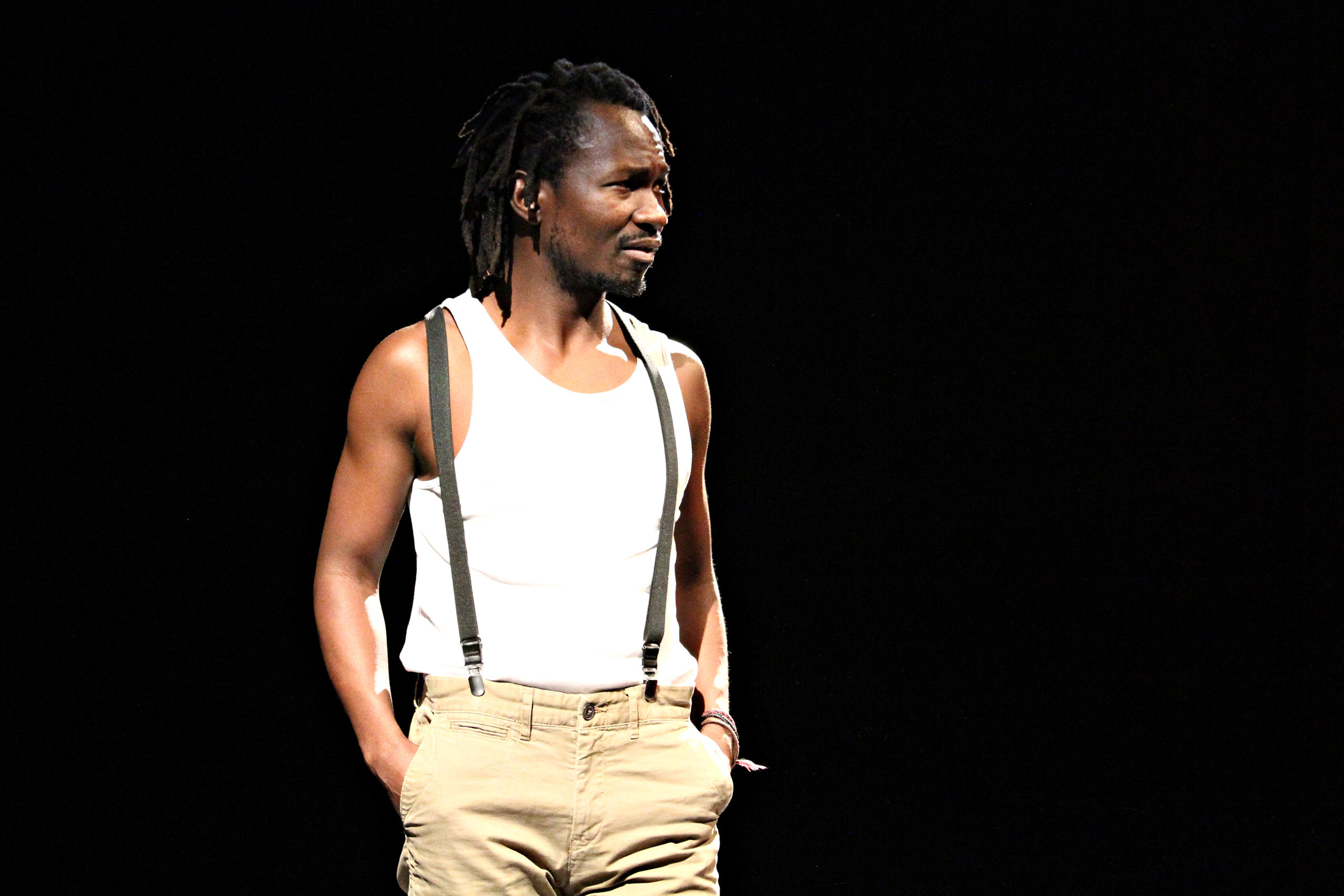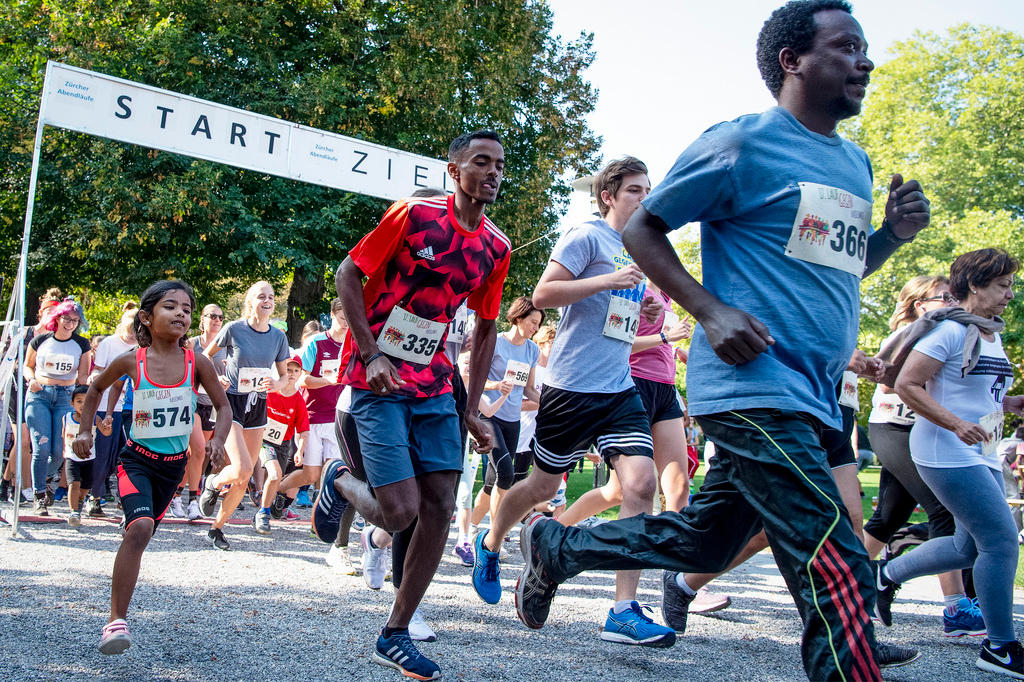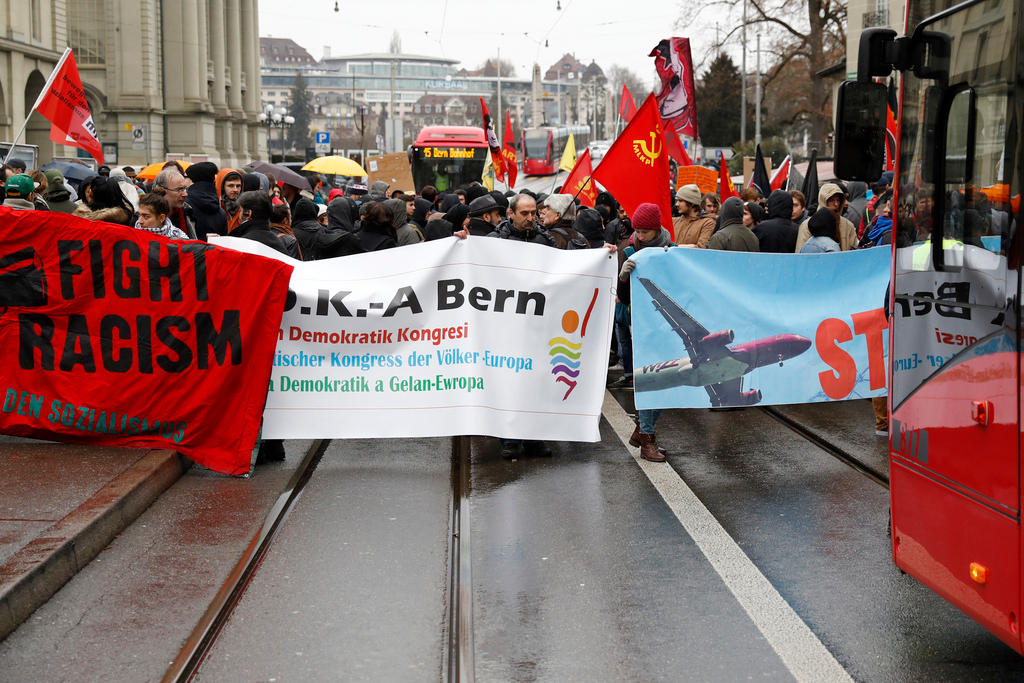Racism: If you see something, say something
Zurich resident Andrew Freeman argues that people in Switzerland need to speak up when they witness incidents of “racial microaggression”.
Not long after reading Christine Worrell’s article on swissinfo.ch about her experiences as a black woman living in Switzerland, I asked a black friend of mine if he had had similar encounters where someone acted insensitively, if not cruelly, towards him because of his skin colour.
He laughed and said that it happens fairly often. He added that he’s become somewhat accustomed to it; for him, it’s just part of the fabric of life for a person of colour in Switzerland.
I also asked him if anyone else ever spoke up on his behalf or objected to how he was being treated. He just looked at me with astonishment; “you’re kidding, right”?

An unsettling experience
A few weeks later, I was at the Zurich airport waiting for a flight. Among the usual assortment of business folks, school groups, couples and families, were a middle-aged black man and a younger woman, perhaps his daughter. To me, they looked like regular middle-class people taking a trip together. They also were the only people of colour in this departure lounge.
I then noticed an airline employee walking through the gate area to check out the departing passengers. She struck me as somewhat overbearing, but that’s not so unusual for people working in that type of environment. What I did find surprising, however, was how she swooped in on the black couple and demanded they have their carry-on bags re-measured to confirm that they didn’t exceed the size restrictions. Their carry-ons didn’t appear to be any different from the luggage the rest of us had.
The man dutifully complied. He didn’t object or raise a fuss; he just carried the bags to another part of the lounge to be inspected, and then returned quietly to his seat next to his companion.
As he was sitting down, the airline employee walked by me. To my surprise, I heard her distinctly mutter out loud, in English, “people need to get themselves organised”!
Now, I’m a pretty low-key person, and I’m reluctant to interject myself into situations that don’t have anything to do with me. And as a well-groomed and ageing white guy who can easily blend in here, I’ve never been on the receiving end of this type of casual hostility.
Nonetheless, with my friend’s comments and Christine’s article fresh in mind, I couldn’t sit there quietly. I asked her, “Why did you single out the only black people here?”
She was astounded. “What! Never! I deal with people from all over the world all the time and ….” I looked squarely at her and said, “Then why those two? The only thing about them that stands out in any way is that they’re the only black people here.”
I left it there; I’d made my point, and didn’t see much value in continuing the discussion. The airline employee went off grumbling to herself, “… really, the nerve. How dare he say that about me!”
I should also note that I was sitting in a different part of the departure lounge from the black couple, and they were facing away from me during my confrontation with the airline employee. As far as I know, they were not aware of my discussion with her.

More
Racial discrimination prevalent at work and school
Common but seldom reported
The prevalence of incidents like this in Switzerland is hard to gauge. According to the Federal Commission against Racism (FCR) and Swiss human rights portal humanrights.chExternal link, there were 301 reported occurrences of discrimination or violence involving black people in 2017. That’s up from 199 reported cases in 2016.
In a 2018 survey conducted by the Federal Statistical Office (FSO)External link, 24% of the respondents said they had experienced at least one type of discrimination in the past five years, and of these, 15% attributed it to their “distinctive physical features such as skin colour”. However, it is unclear how many of the respondents were black.
The EU Agency for Fundamental RightsExternal link also has collected considerable data on the topic of racial harassment in the EU. In its second European Union Minorities and Discrimination SurveyExternal link (EU-MIDIS II), FRA reported that “almost twenty years after the adoption of EU laws forbidding discrimination, people of African descent face widespread and entrenched prejudice and exclusion”.
The EU-MIDIS II study was based on a survey of 5,803 people of African descent in twelve countries. Overall, 30 percent of the respondents described having experienced at least one instance of racial harassment in the past five years. The individual country results ranged from a high of 63 percent in Finland to a low of 20 percent in Malta. For Switzerland’s neighbours, the results were: Germany, 48 percent; Italy, 48 percent; Austria, 37 percent; and France, 32 percent.
FRA also noted that “Very few report such incidents to any authority or body”. Among the 30 percent who said they had experienced racial harassment in the five years before the survey, only 14 percent had reported the most recent incident to any authority.
Whatever the actual incidence of racially motivated taunts and behaviours is in Switzerland, the available data tend to support my friend’s observation that such events are neither uncommon nor unusual.
Speak up!
In my experience, the typically reserved Swiss don’t hesitate to chastise people they see violating accepted social norms. Blithely throw some trash on the ground? Or, forget to empty the lint trap in the tumbler? Good chance someone will call you out for that. And rightly so!
On the other hand, the experiences of my black friends and associates suggest that Swiss people are less likely to react when they observe what have been dubbed racial microaggressions;External link “brief communications, whether intentional or unintentional, that transmit hostile, derogatory, or negative messages to a target person because they belong to a stigmatized group”.
I suspect there are a host of social, cultural and historical reasons for this apparent discrepancy between how Swiss people respond to littering versus microaggressions. I also don’t mean to imply that Swiss people are more racist than citizens from other countries; as the EU-MIDIS II research found, racial harassment is depressingly commonplace across Europe.
Moreover, the literature indicates that microaggressions are more likely to be unintentional in wealthy, highly educated countries like Switzerland; they are often the product of implicit biases that are activated involuntarily and without an individual’s awareness or intentional control. I can’t imagine, for instance, the airline employee at the Zurich airport consciously thought to herself, “Here’s my chance to be mean to some black people”.
Which is why I believe it’s important to call out people who are sending hostile or derogatory messages, whether intentionally or unintentionally. In the episode at the airport, I could see no objective reason for the employee to single out those particular travellers.
My perhaps naïve hope is that our brief interchange will prompt this airline employee, who interacts daily with all kinds of different people, to reflect on her attitudes about people who aren’t white, and in the future think twice before accosting black people who aren’t doing anything out of the ordinary.
In researching this article, I discovered considerable information online about how to respond to different forms of microaggressions and bias. And from what I’ve read, I now wish I’d handled the situation at the airport differently. When I challenged the airline employee, I probably came across harshly because I was genuinely taken aback by this employee’s conduct as well as her utterly gratuitous comment.
· Use calm, neutral expressions: “Excuse me, but I couldn’t help noticing that…”
· Separate intent from impact: “I expect you didn’t realize this but…”
· Promote empathy: “How would you feel if…?”
Humor or gentle sarcasm can often help; for example, “What do you mean black people are lazy? Like Serena Williams (or Tidjane Thiam) doesn’t work as hard as Roger Federer (or Sergio Ermotti)?”
So if you see something, speak up – gently but firmly. It may feel uncomfortable, but it also could lessen some of the scorn or suspicion people of colour unfortunately experience all too often in this otherwise wonderful country.
The views expressed in this article are solely those of the author, and do not necessarily reflect the views of swissinfo.ch.

In compliance with the JTI standards
More: SWI swissinfo.ch certified by the Journalism Trust Initiative













You can find an overview of ongoing debates with our journalists here . Please join us!
If you want to start a conversation about a topic raised in this article or want to report factual errors, email us at english@swissinfo.ch.